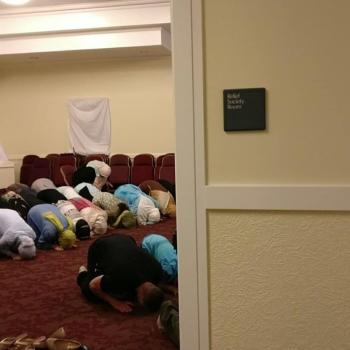
(Wikimedia Commons public domain)
Concluding a section of my manuscript:
God’s all-powerful Lordship is an ever-present reality in the daily life of Muslims. The Qur’an directs its people to say “If God wills” whenever they announce their intention to do something. “Do not say, regarding anything, ‘I am going to do that tomorrow,’ but only, ‘If God wills.’”[1] It is not surprising, thus, that in sha’a Allah (“if God wills”) is one of the most commonly heard phrases in the Arabic language. But many Westerners tend to take it as a mere verbal formula, a cultural habit with little or no thought behind it. Sometimes they think of it as an excuse, offered in advance, for not fulfilling a promise. (The employee says, “I’ll do this right away, in sha’a Allah.” God, it will be explained, just hadn’t willed that the task be completed so soon.) The phrase can become quite an irritant for time-ridden Westerners trying to transact business in a culture that is clearly less concerned about deadlines and rushing about. But it is taken very seriously by devout followers of Islam. I was once rebuked when I told a Muslim friend that I would meet him at a certain place at noon the next day. He waited silently, clearly expecting me to say something else. When I said nothing, he told me politely but firmly to say “If God wills.” “How do you know that you will meet me tomorrow?” he asked. “How do you even know that you’ll still be alive? You could have a heart attack. A car could run over you. Your apartment building could collapse on your head.” (Both of these last two possibilities are real concerns in a place like Cairo.) “It is sheer irreligious arrogance,” he told me, “to believe that you are in charge of your own soul and to leave God out of the picture. If God does not will it,” he said, “you will most definitely not meet me tomorrow at noon!” I must admit, I was chastened.
The Islamic emphasis on the supremacy of God’s will can certainly lead to a kind of fatalism, to a resigned apathy that doesn’t try to improve conditions or to find solutions or to fight diseases or to take care of our health. Things as they are, this view suggests, are the things God has ordained; it would be futile and even blasphemous to seek to change them! I do think that many Muslims tend to overemphasize God’s power and their powerlessness in just that way. Still, there are clear biblical grounds for similar belief:
Go to now, ye that say, Today or tomorrow we will go into such a city, and continue there a year, and buy and sell, and get gain: Whereas ye know not what shall be on the morrow. For what is your life? It is even a vapour, that appeareth for a little time, and then vanisheth away. For that ye ought to say, If the Lord will, we shall live, and do this, or that. But now ye rejoice in your boastings: all such rejoicing is evil.[2]
If Islamic culture perhaps overstresses God’s determination of all things, we in the modern West probably fail to recognize it enough. Overconfidently, we sometimes imagine that all of the problems that have confronted humankind through the centuries have now begun to yield before our technology, our money, and our rational planning. Yet we are not, in the final analysis, really the masters of our fates and the captains of our souls. Our most advanced medical machinery cannot prolong our lives indefinitely, a snowstorm can bring our biggest cities to a standstill, a slight rocking of the earth can level them to the ground. A little more humility before nature and nature’s God would not be amiss. In this respect, as in others, I think we can learn from our Muslim brothers and sisters.
[1] 68:17-33; 18:23-24. James 4:13-16.
[2] James 4:13-16.












